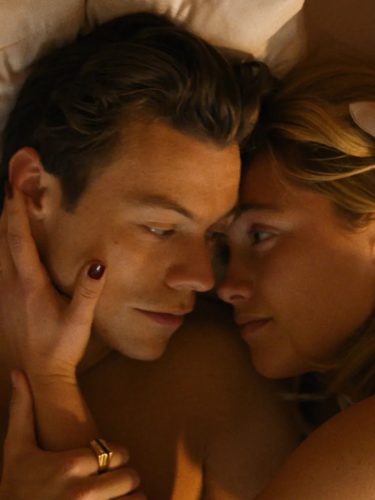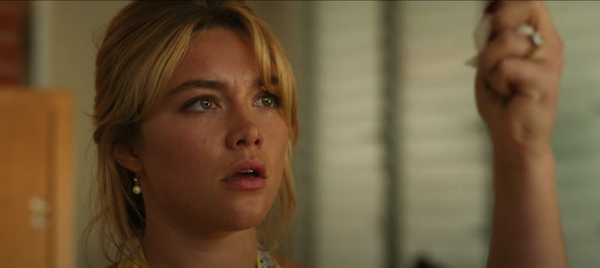Film Review: “Don’t Worry Darling” — Land of the Living Dolls
By Tim Jackson
As a satire on the power of male-dominated corporations to manufacture consent and conformity, Don’t Worry Darling is devilishly amusing. Though credibility is not its strong suit.
Don’t Worry Darling, directed by Olivia Wilde. Opening the Boston Film Festival on September 22. Opens on September 23 at Coolidge Corner Theatre, Kendall Square Cinema, AMC Assembly Row 12, and other cinemas around New England.

Florence Pugh and Harry Styles in Don’t Worry Darling.
The poster for Olivia Wilde’s Don’t Worry Darling features its star, Florence Pugh, and co-star, Harry Styles, cuddling as she looks dreamily into his eyes. That shot is in the film, but it takes its time getting there as the plot careens through a series of genres and garbled plot points. This could be described as a feminist comic satire disguised as a sci-fi/horror film. At the center of the narrative: the tribulations of a happy, amorous couple living in a cultish planned community on a cul-de-sac in the middle of an unspecified desert. Elements of Pleasantville (1998), The Truman Show (1998), and Sorry to Bother You (2018) pop up and about, along with a smattering of notions yanked from Stanley Kubrick’s A Clockwork Orange and Jordan Peele’s Get Out (2017). Is anyone surprised that there are dozens of unanswered questions at the movie’s end?
Pugh is Alice, a coiffed and dutiful housewife in a lusty and adoring marriage with her husband, Jack, played by Harry Styles. Alice is about to wander through her own wonderland. The actress balances her performance nimbly, given that she has to deal with the possible and the preposterous. What sends Alice careening out of control? She begins to pose skeptical questions about the purpose of the “utopian” community to her complacent friends and to Frank, the smarmy leader of this cloistered enclave, played with oily charm by Chris Pine. Shia LaBeouf was scheduled to play the role of Alice’s husband, but he was replaced by Styles, a major music star whose celebrityhood began with the boy band One Direction. (The various indiscretions of the film’s several lead actors have nearly swamped the film’s publicity campaign.) Styles exudes a boyish, short-tempered charisma that works well in the role; at one point this husband rages, with convincing passion, at his wife.
As a satire on the power of corporations, institutions (and men), to manufacture consent and conformity, Don’t Worry Darling is devilishly amusing. Though credibility is not this lampoon’s strong suit. In an early scene, Jack comes home from work and goes down on Alice on the dinner table. As he is diving under her skirts, the perfectly prepared feast goes flying. Lust and cuisine are the primal glue for this and other relationships in this supposed utopia. Apparently (though not believably), that is all that is needed to keep women trapped in their places as domestic servants. Unsurprisingly, cracks begin to appear in Alice’s marriage as well as within the community itself. Meanwhile, unexplained rumblings are shaking the community’s tchotchkes off their shelves. The tremors are unexplained (possibly underground testing of some sort?) but they do work as a metaphor for the shaky state of this Stepford colony.
Every morning, like clockwork, an army of husbands, clad in suits and ties, head off to work in a place of collective employment called the “Victory Project.” Their multicolored Chevys roar off as the wives, clad in pastel shirtwaist dresses, stand in their respective front yards waving goodbye. What the guys do or where they go is unclear. Obviously, they have accepted some sort of devil’s bargain. The women never shop, nor do they appear to do any labor other than housework and attending liquor-soaked parties and dance classes, where they are trained in ballet decorum.

Florence Pugh in Don’t Worry Darling.
One day, traveling as the only passenger on the “Victory Town Link Bus,” Alice sees a plane fall out of the sky on the other side of a mountain range. Going against the rules — no one in the community is allowed to wander beyond designated areas — our heroine is compelled to investigate. She doesn’t find an aircraft (a mystery that is never cleared up), but she stumbles into a strange futuristic building. She suddenly blacks out. Waking up, Alice questions her husband when he gets home about where in the world she has been all day. He suggests that she has merely been sleeping all afternoon. From that point on the film proceeds from one ominous portent to the next: unsettling hallucinations, a suicide, unexplained flashes of Busby Berkeley style female dancers (i.e., the objectification of women), psychedelic flashes of eyeballs, pools of blood, and so on.
Director Olivia Wilde (who also appears as the cold and overly groomed neighbor, Bunny) has directed a farcical thriller that draws on a visually luscious ’50s palette. Don’t Worry Darling’s plot may be seriously disconnected, cobbled together from dystopian ideas we have seen often in better films, but its stylish set designs and costumes are consistently lovely. Music supervisor Randall Poster (director Wes Anderson’s music advisor) helped to put together a bubbly soundtrack of ’50s hits that is effectively juxtaposed against a suitably creepy score by John Powell.
One good reason to watch this film is Pugh’s performance. This is an actor who can leap easily from luscious to lethal. Her sexy toughness is beguiling, as it was in Lady Macbeth (2016), where she played another bride who, captive of forces beyond her control, eventually took charge of her circumstances. Her role took a similar embattled turn in the 2019 cult horror film Midsommer. Don’t Worry Darling is beset with too many gaps in logic to make much sense, but it sells itself on its style and moments of eye-rolling amusement. It is fun to watch the pugnacious Pugh battle her way out of this absurd paper tiger.
Tim Jackson was an assistant professor of Digital Film and Video for 20 years. His music career in Boston began in the 1970s and includes some 20 groups, recordings, national and international tours, and contributions to film soundtracks. He studied theater and English as an undergraduate, and has also worked helter skelter as an actor and member of SAG and AFTRA since the 1980s. He has directed three feature documentaries: Chaos and Order: Making American Theater about the American Repertory Theater; Radical Jesters, which profiles the practices of 11 interventionist artists and agit-prop performance groups; When Things Go Wrong: The Robin Lane Story, and the short film The American Gurner. He is a member of the Boston Society of Film Critics. You can read more of his work on his blog.

Cogent and well considered.Thanks